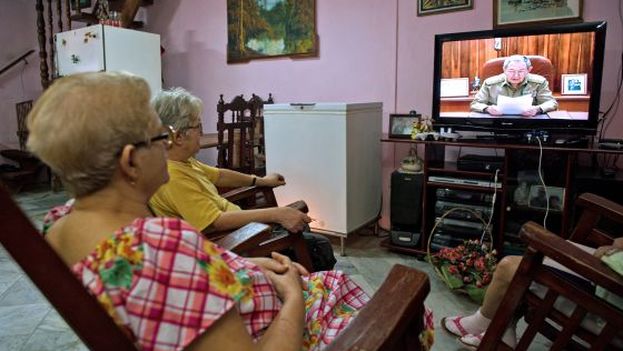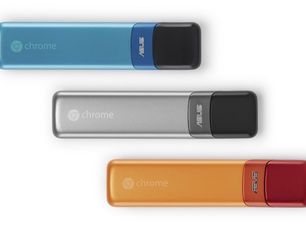
![]() 14ymedio, Yoani Sanchez, Havana, 3 April 2015 — He is the king of the room. With his screen and speakers, no one looks away or ignores him. In front of our television sets, millions of Cubans have cried, laughed, and spent a good part of our lives. Now, thanks to new technologies, our relationship with this “idiot box” could begin to change. The devices that convert our little screens into computers are already here and are an option to computerize our families.
14ymedio, Yoani Sanchez, Havana, 3 April 2015 — He is the king of the room. With his screen and speakers, no one looks away or ignores him. In front of our television sets, millions of Cubans have cried, laughed, and spent a good part of our lives. Now, thanks to new technologies, our relationship with this “idiot box” could begin to change. The devices that convert our little screens into computers are already here and are an option to computerize our families.
Google has launched the market for devices that convert TV sets into intelligent machines that help us to calculate, write, connect to the Internet and countless other functions. The device that achieves such a wonder resembles a USB flash drive, like the ones we’re used to passing from hand-to-hand to share information, audiovisuals, videoclips and programs. However, unlike these flash memories used to store data, the new creature conceived in Mountain View, California, holds within it the potential of a computer.
In the last census of population and housing, conducted in 2012, Cubans confessed to owning 759,164 black-and-white TVs, while 2,922,099 of their more sophisticated relations throughout the country had color TVs. It’s worth using the word “confess,” because it is still a very common practice to hide from the State’s prying eyes any technological infrastructure one relies on. “To the police, better to throw them off the scent,” we teach our kids at home, and all official surveys will be burdened by this component of popular suspicion.
It should be taken as certain, however, that in the majority of Cuban homes there is one of these “self-sufficient fatties” bellowing away all day long. Even in the poorest households, where there is no supply of drinking water and the sheets covering the bed are worn down to barely more than “onion skins” or lacking altogether, there is a television. Our whole culture is intrinsically linked to this box of miracles that dazzled our grandparents, indoctrinated our parents, and will help to free our children.
A device that manages to convert this screen that talks to us into a piece of equipment that we interact with, will be a necessary and massive change. And if the housewife who consumes a minimum of six hours a day of telenovelas and reality shows is able to conduct business, learn a profession, manage her finances or apply for a loan from the same TV that is already in the living room? Could it transform the passivity of a consumer in to the interactivity of a user?
In collaboration with the Taiwanese technology company Asus, Google has announced the new Chromebit device that connects to modern televisions and makes them function as computers. The apparatus will arrive in the market this summer and will be available for less than $100 (U.S.), according to the company’s statement. It will be able to connect to flat screen TVs with a USB or HDMI port.
The Chromebit continues the saga of previous inventions and will provide a complete version of Google’s operating system, Chrome OS. It will also be able to connect via Bluetooth and WiFi to other devices, as well include applications able to begin working without the need to connect to the great World Wide Web. That it, it will work very well with the Internet, but it will also work without it for the inhabitants of this “Island of the Disconnected.”
Although the statistics published to date don’t tell us how many TVs in Cuba have USB or HMDI ports, a few hours spent at customs at any airport makes it clear that these appliances are flowing into the country. A brief tour of on-line classified sites also give the impression that we are going to be drowning in smart TVs.

Very well, if Cuba meets two characteristics tied to the Chromebit – a need to computerize ourselves and television viewing embedded in our DNA – we shouldn’t have to wait too long to see our country benefit from devices of this type. Now that Google executives have visited our island twice, could Chromebit but a project to encourage here?
If humanitarian aid works based on the concept of “don’t give me fish, teach me how to fish,” the same should apply to these telecommunications companies, which don’t have to teach us to “be free” – we carry this in our genes – but they can offer us the infrastructure to cut the chains for ourselves.
“Hopefully it will rain Chromebits on the (Cuban) countryside,” we might say, to paraphrase a well-known song by Juan Luis Guerra.
